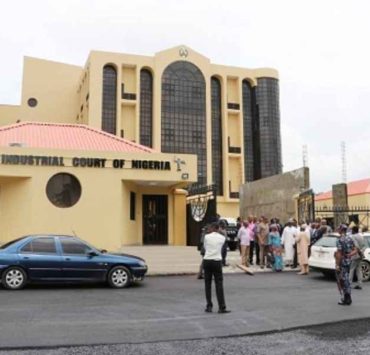AGWU ORS v. JULIUS BERGER [NIG.] PLC: On Proper Step for Court Where Similar or Overlapping Reliefs are Sought in Both Interlocutory Application and Substantive Suit: An Insight into the Supreme Court Landmark Decision

Chukwudi Onyewuchi is a graduate of Geology from Obafemi Awolowo…
CITATION: [2019]11 NWLR PT.1682 AT 165.
Courtesy: Moruff O. Balogun Esq.
Summary of Facts:
The respondent is a public limited liability company. The appellants were some of its employees. The respondent informed its employees that it intended to declare some of them redundant, and that employees declared redundant and paid, should vacate its quarters within a period of two days after payment.
The respondent’s workers felt threatened by the information as they did not know who would be declared redundant. They collectively took out a writ of summons in a representative capacity. They sought perpetual injunction to restrain the respondent from declaring them redundant and from ejecting them from their official quarters. They also filed a motion on notice by which they sought an interlocutory injunction to restrain the respondent from declaring them redundant and from ejecting them from their official quarters.
While the motion on notice was pending, the respondent declared the appellants redundant and paid them their terminal benefits, which they collected. After a futile attempt at committing the respondent for contempt of court, the appellants filed another motion on notice for an order reinstating and deeming them employees of the respondent pending final determination of the substantive suit. The respondent opposed the appellants’ second motion on notice by filing a counter affidavit. The trial court heard the motion.
In its ruling, the trial court held that since the declaration of redundancy against the appellants was made after the filing of the suit, it amounted to the respondent taking into its hands a matter, which was subjudice. So the trial court further held that the appellants were deemed to be in the service of the respondent until the final determination of the substantive suit, and it ordered the respondent to accord the appellants all rights, duties, responsibilities, and privileges of their offices to which they were entitled or responsible prior to the commencement of the suit. The trial court also ordered the appellants to refund any terminal benefit they may have collected from the respondent and that the parties should maintain the status quo ante bellum pending the determination of the substantive suit.
The respondent appealed to the Court of Appeal on the ground, inter alia, that the trial court prejudged the substantive suit in the course of its ruling and in making its order. The appellants were also dissatisfied with the ruling. They appealed to the Court of Appeal. Additionally, they filed a preliminary objection to the respondent’s appeal.
The Court of Appeal found that the trial court, while determining the application before it, construed a document challenged in the writ of summons, which commenced the substantive suit, and that the trial court determined substantive issues in its ruling. The Court of Appeal dismissed the appellants’ preliminary objection but allowed the two appeals, set aside the ruling and orders of the trial court, and remitted the suit to the trial court for hearing by another Judge of the court.
The appellants appealed to the Supreme Court. They argued that the Court of Appeal erred in dismissing their preliminary objection and that it lacked the jurisdiction to hear and determine respondent’s appeal. They based their argument on the ground that the appellants’ appeal at the Court of Appeal was incompetent because the respondent first ground of appeal, from which its sole issue for determination was formulated, was vague and was not against a decision made by the trial court.
HELD: Unanimously dismissing the appeal.
The following issues were raised and determined by the Supreme Court:
- On Proper step for court where similar or overlapping reliefs are sought in both interlocutory application and substantive suit : When determining an interlocutory application, courts are enjoined to talk less in the determination of the prayers submitted for resolution. Where the prayers overlap with the substantive claims, it is safer to refuse such application and order for the hearing of the substantive matter. In this case, the reliefs sought in the substantive suit and on the two notices of motion were substantially the same. And in deciding the interlocutory application before it, the trial court went on to comment extensively on the substantive reliefs sought in the writ of summons. Therefore, the Court of Appeal rightly set aside the decision of the trial court and ordered for a trial of the substantive suit before another Judge.
- On Reason why court should refrain from determining substantive issues in suit when determining interlocutory applications : The reason why a court should not determine substantive issues in case when determining an application for interlocutory injunction is because at that stage of the suit, the only evidence is the incomplete and un-tested affidavit evidence. Further, it is best that the court avoids the resolution of complex and intricate issues of facts since at that stage the veracity of the affidavit evidence would not have been tested in cross-examination.
- On Duty on court to refrain from determining substantive issues when determining interlocutory applications : Courts are not allowed to delve into or decide the main complaint in a suit at an interlocutory stage. Courts must avoid the determination of a substantive issue at interlocutory stage. That is, it is improper for a court to make pronouncement on issues capable of prejudging the substantive issues before the court in the course of interlocutory proceedings. In other words, since interlocutory applications are usually dealt with before the substantive suit, a court should not say or do anything at the interlocutory proceedings that would jeopardize the just and proper determination of the suit at the trial. In this case, the Court of Appeal rightly held that the trial court erred in its ruling when it went beyond the reliefs sought on the appellants’ motion on notice and delved into the substantive issue of the status of the appellants as employees of the respondent.
- On Whether ground of appeal complaining about lack of Jurisdiction but not arising from judgment of court appealed against is competent : As a general rule, a ground of appeal against a decision must relate to the decision and should constitute a challenge to the ratio of the decision. But where a ground of appeal questions the jurisdiction of a court, it does not matter whether the issue of jurisdiction constituted the ratio of that decision or not. Such a ground of appeal cannot be said to be incompetent by reason that it does not arise from the decision and constitute a challenge to its ratio decidendi.
- On Proper step for claimant where defendant fails to stop acts complained about in a pending suit : Where a defendant is aware of a pending suit by virtue of service of court processes on the defendant, but fails to stay action pending determination of the suit, as the respondent did in this case, the best option for the claimant is to initiate contempt proceedings against the defendant.
- On Whether court can compel unwilling employer to retain employee : A court will not compel an unwilling employer to retain employees the employer does not need. The only thing a court can do is to order for payment of all entitlement of the employees, based on the provisions of the contract of employment. In this case, the respondent is a public liability company and the appellants were its employees. So, the trial court’s order deeming the appellants as the employees of the respondent was beyond the trial court’s powers. The Court of Appeal was right when it set aside the order.
- On Meaning of “interlocutory” : The word “interlocutory” means interim or temporary; not constituting a final resolution of the whole controversy.
Courtesy:
Moruff O. Balogun Esq.
Ijebu Ode, Ogun State.
08052871414.
Chukwudi Onyewuchi is a graduate of Geology from Obafemi Awolowo University. He enjoys writing and is passionate about what he does. Hence, he always puts in all of his efforts towards attaining good results and sharing stories that will impact readers and the world at large.















